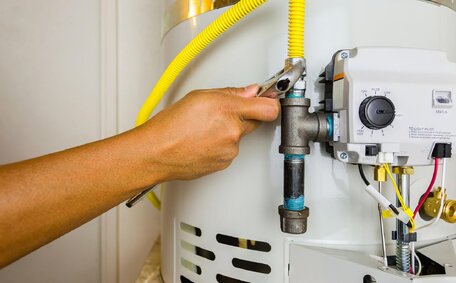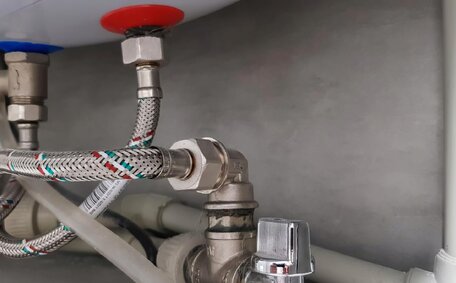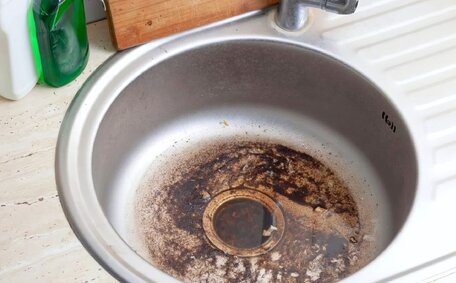How Tankless Water Heaters Work
Tankless hot water system solutions, also known as on-demand or instantaneous models, provide hot water directly without the use of a storage tank. In contrast, traditional water heaters continuously heat and reheat water within a tank, leading to energy wastage.
Water heaters use a heat exchanger that utilises gas, propane, or electricity and heats water on demand. In operation, turning on a hot water tap sends cold water through a pipe into the unit. The water flows through a heat exchanger that warms your water. You get an uninterrupted hot water supply for the duration of the tap being on. Once the tap is turned off, heating stops until hot water is required again.
The technology behind tankless systems means water is only heated when necessary, without paying to perpetually maintain stored water at a set temperature. This water heating approach allows tankless hot water systems to achieve greater energy efficiency compared to storage designs. However, it’s important to consider flow rate and simultaneous hot water demands when selecting and installing a unit.
Benefits of Tankless Systems
Understanding the pros cons of tankless water heaters reveals several advantages over conventional storage tank water heater models:
Energy Efficiency
Tankless water heaters eliminate standby heat loss by heating water as needed, without the continual energy wastage of reheating stored water. Their efficient on-demand function typically results in energy savings of 25-50% over traditional tank models.
Long Lifespan
How long does a tankless water heater last? Tankless water heaters typically have a lifespan exceeding 20 years, outlasting traditional tank heaters, which often last only 10-13 years. Tankless models require less maintenance and last longer due to fewer parts and no tank corrosion.
Space Savings
Tankless water heaters’ compact design allows wall mounting, which liberates floor space. Their small size suits urban homes or apartments with limited areas for utilities, so there’s less to worry about regarding space.
Continuous Hot Water
Tankless systems deliver a reliable hot water supply, even during times of multiple simultaneous uses. They heat water endlessly on-demand, supporting multiple fixtures at once.
Lower Energy Bills
Energy-efficient tankless water heaters can significantly reduce monthly power bills, with potential savings of $100 or more annually.
While upfront costs are higher, gas tankless water heaters lead to long-term savings with their lower energy consumption. Carefully sized electric tankless water heater models also provide efficiency gains for households with lower hot water needs.
Endless Hot Water Supply
Unlike the limited capacity of a storage tank hot water heater, Tankless systems offer an uninterrupted supply of hot water on demand. They deliver hot water instantly, eradicating the inconvenience of depleting hot water or waiting for tank reheating prevalent in conventional water heaters.
Tankless heaters feature built-in flow sensors that detect water flow when a hot tap is opened. An endless stream of hot water is then supplied for as long as required. Multiple taps can be used simultaneously without depleting supply.
The uninterrupted hot water supply of tankless water heaters suits busy Castle Hill households with considerable usage needs. Whether long teenager showers, multiple loads of laundry, or families hurriedly preparing for their days, this type water heater provides an uninterrupted hot water supply to support these lifestyle needs.
Tankless heaters provide consistent hot water around the clock by heating directly, without the need for storage. Your home can benefit from this unlimited supply in support of daily activities and peak usage periods.
Energy Efficiency and Cost Savings
Tankless water heaters are highly energy efficient as they avoid the standby heat losses associated with heating and reheating water stored in tanks. Because they only heat water on-demand when required, tankless models are more efficient, reducing energy usage by 25-50% compared to conventional tank storage water heaters.
By cutting energy consumption, gas-powered tankless systems can keep up significant savings on utility bills over their lifespan. Homeowners may save over $100 per year on energy costs with a properly sized and installed unit.
Tankless water heaters also lower greenhouse gas emissions through reduced electrical or gas usage, due to their exceptional energy efficiency. Their eco-friendly credentials, compatible with solar panels, align with the sustainability awareness of environmentally conscious Australian households.
Despite higher initial purchase and installation costs, a gas tankless water heater can pay for itself over time through lower energy bills. Carefully sized electric tankless units also provide efficiency gains for households with more modest hot water needs.
Compact Size
Tankless water heaters feature a compact, space-saving design without a bulky storage tank. With the form factor of a small suitcase, tankless water heaters conveniently mount on walls, optimizing use of limited spaces. This sleek size suits urban homes or apartments in Castle Hill and other areas where available space can be limited.
Average tankless units, at roughly 50 cm high by 45 cm wide, occupy significantly less space than the traditional 190-300 litre storage tank heaters. Their compact dimensions are advantageous for homeowners with small utility rooms, garage installations, or restricted spaces.
Tankless models offer spatial flexibility, allowing installation in areas unlike fixed tank systems. Units can be installed in unconventional areas like attics when wall space is scarce. This adaptability streamlines integration into both new and existing homes.
Considerations Before Installing Tankless
While tankless water heaters provide advantages, their installation has some important considerations compared to traditional storage tank heaters.
Qualified technicians are recommended for tankless installations, as they typically require upgrading household plumbing and gas lines to accommodate sufficient water flow rates and fuel delivery.
Venting Requirements
Tankless heaters with a pilot light must be properly vented for gas models to safely exhaust combustion gases. Venting methods differ for electric and gas units. Professional installers can handle venting needs.
Considering the cost concerns of tankless water heaters? Purchase and installation of tankless heaters range from $2,000 to $4,000, in contrast to the $500 to $1,500 for storage tank heaters. However, energy savings often offset the higher initial investment over time.
Sizing For Peak Demand
Tankless heaters should be sized based on a home’s peak how much hot water needs to deliver their full benefits. An analysis of usage, flow rate, and temperature rise ensures proper sizing.
Higher Upfront Costs
Tankless water heaters present higher upfront purchase and installation costs than traditional storage tanks but offer long-term savings. Tankless units generally cost between $2,000 to $4,000, compared to $500 to $1,500 for conventional storage tank heaters, inclusive of installation.
The increased expense stems from the more complex installation process, which may require upgrading home gas lines, electrical wiring, or water pipes to accommodate sufficient flow rates. Professional installation by a qualified technician can also add to costs but helps ensure optimal efficiency and safety.
Despite higher upfront costs, energy bill savings over a tankless water heater’s 20+ year lifespan often offset the larger initial investment. Compared to replacing traditional units every 10-13 years, tankless models save money long-term through significantly lower energy usage during operation.
Low Flow Rate Limitations
One cons tankless water heaters is that they can struggle to deliver sufficient hot water during periods of high demand. If too many hot water taps and fixtures are utilised simultaneously, the flow rate may be inadequate.
Tankless heaters typically have flow rates between 13 to 30 litres per minute, depending on the model and energy source. Tankless gas models typically offer higher flow rates than electric. In large homes with multiple bathrooms, this rate may prove insufficient for simultaneous showering or appliance use.
To enjoy the full advantages of ondemand hot water, homeowners should select a tankless unit sized appropriately to meet your needs during peak usage times. Expert advisors can help determine which capacity and flow rates suit different home requirements.
With gas lines or electrical wiring upgraded accordingly during installation, most tankless heaters can sufficiently service an average Castle Hill household. But for larger homes, a high performance model may be recommended to ensure a robust flow rate even during peak simultaneous demands across multiple fixtures.
More Complex Installation
Installing a tankless water heater requires more complex modifications compared to traditional tank systems. Efficiency and safety are guaranteed when tankless water heaters are professionally installed by certified technicians.
Plumbing Upgrades
To accommodate sufficient water flow rates, household plumbing may need upgrading when switching to a tankless unit. Gas pipes, water lines, and fixtures should be assessed and potentially replaced if undersized.
Electrical Upgrades
Gas and electric tankless heaters demand more power than storage tank models. Electrical panels and wiring should be evaluated to confirm adequate capacity, with upgrades completed as needed.
Local Infrastructure Considerations
Castle Hill homeowners exploring tankless water heaters should review local natural gas infrastructure or electric supply capabilities when planning appropriate fuel options and installation.
Engaging with qualified Castle Hill plumbing professionals like our team helps ensure your homes utilities are ready for new hot water heaters, specifically tankless systems.
Making the Decision: Is Tankless Right for You?
Consider your daily water consumption and usage patterns when deciding if a tankless water heater meets your needs.
Tankless models provide continuous flow - ideal for homes with high demand.
Contact our Castle Hill plumbing experts to evaluate if tankless water heaters meet your specific hot water demands. We offer no-obligation consultations to gauge existing infrastructure, measure peak demand, and ensure the right system size. Leverage our expertise advising Castle Hill clients on energy efficient upgrades yielding long-term savings.
Understanding Maintenance Requirements
Tankless water heaters require more regular maintenance than traditional tank models. Annual tasks like inspecting key components and descaling the heat exchanger help maintain efficiency and extend the lifespan of your unit.
Descaling
Over time, hard water can lead to mineral scale buildup within a tankless heater, decreasing both flow rates and efficiency. Annual descaling mitigates scale buildup and corrosion, maintaining the heater’s efficiency.
Filter Inspection
Certain tankless units have replaceable filters to protect against sediment accumulation. Checking and replacing filters per the manufacturer’s recommendations prevents debris obstructions.
Leak Checks
Periodically inspecting your tankless water heater water and gas fittings for leaks safeguards against potential damage or hazards resulting from small cracks or loose connections over years of use.
Professional Servicing
Although basic maintenance can be performed by homeowners, it’s advisable to engage professional plumbers annually for a comprehensive inspection and tune-up of your tankless water heater. Expert servicing guarantees that your tankless unit operates safely and maintains efficiency well past its warranty period.






